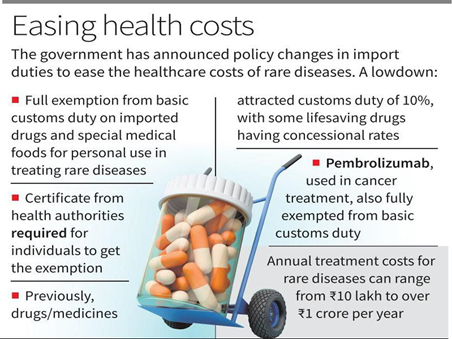

31st March 2023 (8 Topics)
Context
The Central Government has given full exemption from basic customs duty on all Rare Diseases drugs.
About the development:
- The Central Government has given full exemption from basic customs duty on all drugs and food for special medical purposes imported for personal use for treatment of all Rare Diseases listed under the National Policy for Rare Diseases 2021.
- In order to avail this exemption, the individual importer has to produce a certificate from Central or State Director Health Services or District Medical Officer/Civil Surgeon of the district.
- Drugs/Medicines generally attract basic customs duty of 10%, while some categories of lifesaving drugs/vaccines attract concessional rate of 5% or Nil.

What are ‘rare diseases?
- These are often serious, chronic, and life-threatening conditions.
|
WHO defines a rare disease as” an often debilitating lifelong disease or disorder with a prevalence of 1 or less, per 1000 population”. |
- However, different countries have their own definitions.
- A disease or disorder is defined as rare in India when it affects less than 1 in 2500 individuals.
- There may be as many as 7,000 rare diseases, individual diseases may be rare, and the total number of people with a rare disease is large.
- Examples:Lysosomal Storage Disorders (LSD), Gaucher disease, Pompe disease, cystic fibrosis, musculardystrophy, spina bifida, haemophilia, MPS 1 and 2, and Fabry disease
The Drug Regulatory System in India:
- The Drug Regulatory Authority (DRA) is the institution in charge of developing and enforcing the majority of pharmaceutical legislation and regulations.
- Its main responsibility is to assure drug quality, safety, and efficacy, as well as product information accuracy.
- This is accomplished through enacting regulations that ensure the manufacture, procurement, import, export, distribution, supply, and sale of medications, as well as product promotion and advertising and clinical studies, are carried out following established the Central drugs standard control organisation (CDSCO), guidelines.
|
About CDSCO:
|
About National Policy of Rare Diseases (NPRD):
- The National Policy of Rare Diseases (NPRD) was notified in March 2021.
- Aim:
- To increase focus on indigenous research and local production of medicines.
- To lower the cost of treatment of rare diseases.
- To screen and detect rare diseases early at early stages, which will in turn help in their prevention.
- Categorization: The policy has categorized rare diseases into three groups:
- Group 1: Disorders amenable to one-time curative treatment.
- Group 2: Those requiring long-term or lifelong treatment.
- Group 3: Diseases for which definitive treatment is available but challenges are to make an optimal patient selection for benefit, very high cost, and lifelong therapy.
- Financial Support:
- Provision for financial support of up to Rs.50 lakhs to the patients suffering from any category of Rare Diseases and for treatment in any of the Centre of Excellence (CoE) mentioned in NPRD-2021, outside the Umbrella Scheme of Rashtriya Arogaya Nidhi.
|
Rashtriya Arogya Nidhi: The Scheme provides financial assistance to patients, living below the poverty line (BPL) and who are suffering from major life-threatening diseases, to receive medical treatment at any of the super speciality Government hospitals/institutes. |


